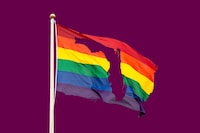
The state’s official tourism marketing arm says “gay” a lot in its promotional materials. But Florida is now in the spotlight for legislation that critics have dubbed the “don’t say gay” bill that was passed this week by the state Senate but has not yet been signed into law by Gov. Ron DeSantis (R).
Officially called the Parental Rights in Education bill, the legislation prohibits classroom instruction on sexual orientation or gender identity between kindergarten and third grade, “or in a manner that is not age appropriate or developmentally appropriate for students.” Opponents have said the proposed law could harm LGBTQ kids, or children whose parents are gay; President Biden called it “hateful.” The bill has prompted protests at schools, the state Capitol and outside Disney World; outcry from activists; and responses from celebrities on social media.
For those who have worked for years to bring LGBTQ travelers to the state, the message is the opposite of the welcoming, inclusive environment they have tried to foster. They’re hopeful that the angry response to the bill won’t keep visitors from supporting those gay-welcoming bed-and-breakfasts, bars, restaurants, and cultural institutions.
Visit Florida declined to comment on the bill and its potential impact on tourism. But the organization’s president and CEO, Dana Young, stressed the group’s focus on diversity and inclusivity and said LGBTQ travelers had “long been an integral component of our marketing efforts.” Visit Florida said market research shows that 3.4 percent of the 117.2 million domestic visitors to the state in 2019 — or nearly 4 million people — identified as lesbian, gay, bisexual or another orientation that was not heterosexual. Those visitors represented billions of dollars in spending.
“We like to say at VISIT FLORIDA that Florida’s sunshine is for everyone — no matter where you are from, what you believe, whom you love, or what your abilities,” she said in a statement. “We want all travelers within the LGBTQ community to know that Florida is a place for everyone. We pride ourselves on welcoming every visitor with the same hospitality and friendliness.”
DeSantis’s press secretary, Christina Pushaw, said in an email Thursday that the governor had not yet received the bill, which she noted does not set apart any sexual orientation or group. She said she assumes anyone who might avoid Florida because of the bill has not read it but has been misled by what she called “appalling media bias.”
“But if anyone actually boycotts Florida because they’re upset about the lack of sex and gender theory instruction in our kindergarten through 3rd grade classrooms, I’m confident that our state is better off without them,” she wrote.
Visit Lauderdale, the tourism bureau that includes gay favorites Fort Lauderdale and Wilton Manors, has been doing “serious, committed outreach” to the community since 1996, President and CEO Stacy Ritter said in an interview. She said she hopes travelers won’t hold lawmakers’ actions against the destination.
“We’re hoping that people can separate the hateful things that are going on in Tallahassee from the really progressive things we’re doing here,” she said.
Rachel Covello, CEO of OutCoast, a platform that markets the state as an LGBTQ-inclusive destination, said she has already heard from some people who have called Florida homophobic or asked how she could promote it to visitors.
“This is the time more than ever to travel to Florida, to be seen, to be heard, to say gay,” she said.
She said avoiding the state would hurt businesses like restaurants, shops and hotels that are owned by members of the community and harm progress in cities that are becoming more inclusive.
“I don’t want to wave a white flag,” Covello said. “I want to wave a rainbow flag. And I want to wave a rainbow flag in a place that doesn’t have any rainbow flags.”
The International LGBTQ+ Travel Association, which is based in Fort Lauderdale, does not support boycotts, but President and CEO John Tanzella said in a statement that the group often sees them following laws like the one Florida lawmakers just passed.
“The ‘Don’t Say Gay’ bill is hostile to our community and bad for the destination,” he said in the statement. “Once again, an already marginalized community is targeted for political reasons.”
Hunter O’Hanian, executive director of the Fort Lauderdale-based Stonewall National Museum & Archives, said the 2022 bill follows the pattern of earlier anti-gay efforts in the state in the 1950s, ’60s and ’70s. He said that by passing the bill, lawmakers are sending the message that it’s not good to talk about being non-heteronormative.
“It’s completely contrary to what the state and the economic travel industry has been pushing,” he said, pointing out that the LGBTQ community have dollars rolling in to South Florida, Orlando, St. Petersburg, Tampa and other cities. “But at the same time the public policy leaders … are giving everyone the message that being gay is something that is not to be spoken of.”
O’Hanian said the museum and library, where nearly 40 percent of visitors are from out of state, have put out little dishes containing pins that say “Say Gay.”
“We’ve gone through 500 of them so far, and we just ordered another 500,” O’Hanian said.
He urged potential visitors not to bypass the destination because of “quite frankly, a group of knuckleheads who are trying to push a political agenda.”
Controversy over the bill has already ensnared Disney, one of Florida’s biggest private employers. The entertainment giant was slammed for not taking a public stand against the bill before it passed; CEO Bob Chapek said Wednesday that the company had opposed it from the start but hoped to work behind the scenes “to achieve a better outcome.”
During the company’s annual shareholder meeting, Chapek said he and LGBTQ staffers would meet with DeSantis to express their concerns. DeSantis’s office said Wednesday that no in-person meeting has been scheduled.
The Orlando area, which includes Disney’s theme parks as well as Universal parks and SeaWorld, is another top Florida destination for LGBTQ travelers. More than 150,000 travelers flock to the theme parks, hotels, restaurants and clubs every June for the multiday “GayDays” event. Visit Orlando invites LGBTQ travelers to pay respects at the former site of the Pulse gay nightclub, where an interim memorial honors the 49 people who were killed in a 2016 mass shooting.
“Orlando has always been and will continue to be a diverse, welcoming and inclusive community,” Visit Orlando President and CEO Casandra Matej said in a statement. “This type of legislation could jeopardize future decisions to come to our destination and have negative impacts on the industry.”
GayDays president Chris Manley said he expects a huge bash this year after skipping the last two because of the pandemic. He believes the bill won’t hurt the event, and it might motivate more people to show up — dressed in the standard uniform of red T-shirts.
“This year I’m hoping to see more and more custom ones that say ‘I say gay,’” he said.








